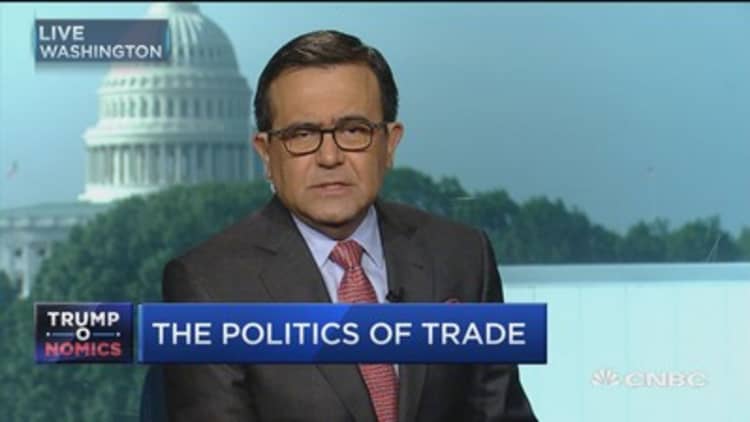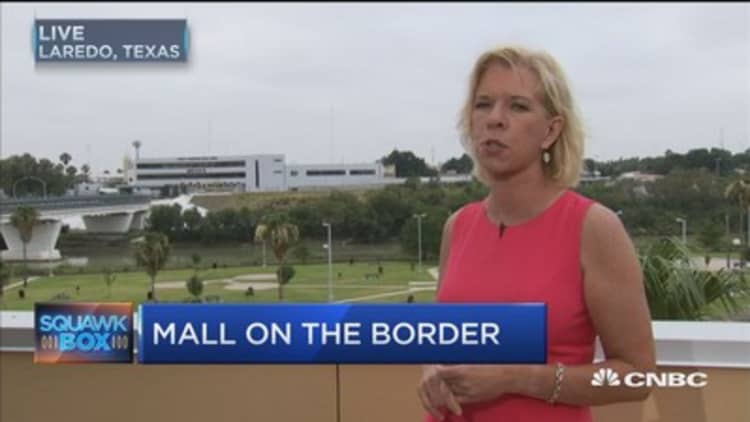
The Mexican peso has recovered all its losses versus the U.S. dollar made since President Donald Trump was elected, discounting the worst fears of a trade war between the U.S. and its southern neighbor.
"The peso is on a big round trip," said Robert Sinche, chief global strategist at Amherst Pierpont. Dollar/
"Even though it's the best performing currency against the dollar since the end of December, it's the eleventh best since the end of October. It's been a big down, big up — one of the more extreme. I think it's more extreme not because of anything going on in Mexico but it's reaction to U.S. fears," said Sinche.
Mexico's peso was stronger against the dollar this week, in a relief rally after the PRI party candidate Alfredo del Mazo Maza edged out a win against more populist candidates for governor in the important state of Mexico. PRI is the party of President Enrique Peno Nieto.
The peso also got a lift from fading expectations for a trade war. The U.S. and Mexico Tuesday agreed to limit Mexican sugar imports into the U.S., and Mexico agreed to increase prices at which raw sugar will be sold at its mills. The peso was up 2.2 percent for the week against the dollar.
The sugar deal, announced by Mexico and Commerce Secretary Wilbur Ross, was seen as a positive step ahead of the renegotiation of the North American Free Trade Agreement this summer.
"The bark has been much louder than the bite out of Trump and that's why the whole NAFTA threat is far more diminished. I also think he's gotten a tremendous amount of pressure from everybody on this side of the border," said Boris Schlossberg, BK Asset Management's managing director of foreign exchange strategy. "I think the market is discounting any serious trade intervention. Ultimately they know his economic advisers are very much pro-free trade."
Trump, as a candidate and after his election, threatened retaliatory trade action against Mexico, which had a $63 billion trade deficit with the U.S. last year. He also demanded Mexico pay for a wall on its northern border to cut down on illegal immigration, though there is no sign Mexico will pay for it as he has demanded.
Mexico's currency was volatile even before the U.S. presidential election. But the peso nosedived right after the November election, hitting bottom at 22.03 in January, just around Trump's inauguration.
Since taking office, Trump has been more talk than action on many fronts. The decline of the peso was one of the most pronounced "Trump trades" since the presidential election, but other trades tied to the administration's programs have also reversed, such as infrastructure stocks and small caps.
Trump has not started the retaliatory trade activity feared by the markets. Congress also is unlikely to pass a House proposed border adjustment tax as part of tax reform. The border adjustment tax would tax imports at the border, and analysts expect it would have driven up the dollar sharply. Instead, the dollar is in a downtrend.
Trump did force the renegotiation of NAFTA and has slapped tariffs on Canadian soft lumber, another long-disputed trade issue. The deal with Mexico to limit its sugar exports avoids retaliation from Mexico on U.S. high-fructose corn syrup imports.
"Sugar is one of the longer-standing issues with Mexico," said Marc Chandler, Brown Brothers Harriman chief currency strategist. Chandler said the action of going after a pre-existing source of contention is how Ross also dealt with China on aluminum and Canada on lumber.
"It suggests by agreeing to the sugar deal before NAFTA negotiations begin in earnest, this is a sign of good will on Mexico's part. That's my sense of what countries are doing. They don't want to be the subject of Trump's tweets. They are making some small concessions," said Chandler.
Under the agreement, Mexico would be limited from exporting more than 30 percent of its refined sugar exports to the U.S., down from more than 53 percent.
While the peso has been rallying since the Mexico state election, analysts caution it's too soon to say PRI, viewed as the more business-friendly party, would be triumphant in the national election next year.
"The danger is the populism in the White House causes people to push back," Chandler said. "Mexico has been the brunt of a lot of sloganeering by Trump and is pushing back."
"The peso has recovered everything, but in some
Watch: A $120 million outlet mall on Mexican border



